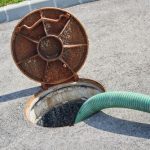How to Maintain a Healthy Septic System in a Rural Area

Understanding your Septic System
Before diving into maintenance tips, it’s important to have a basic understanding of how a septic system works. A typical septic system consists of three main components: the septic tank, the drain field, and the soil. When wastewater flows from your house, it enters the septic tank, where the solid waste settles at the bottom and forms sludge. The liquid portion, called effluent, then flows to the drain field and gets gradually absorbed into the soil, where further treatment occurs through natural processes.
Regular Pumping Schedule
Regular pumping is one of the most important aspects of septic system maintenance. Over time, solid waste accumulates in the septic tank, and if not pumped out periodically, it can cause blockages and backups. The frequency at which you should pump your tank depends on factors such as the tank size, the number of occupants in your house, and the volume of wastewater produced. As a general guideline, most experts recommend pumping every three to five years.
Water Conservation
Conserving water is not only beneficial for the environment but also for your septic system. Excessive water usage can overwhelm the system and hinder its ability to effectively treat and dispose of wastewater. Implementing water-saving habits such as fixing leaky faucets, installing low-flow fixtures, and spreading out household chores that require water can significantly reduce the strain on your septic system.
Proper Waste Disposal
What you put down your drains can have a significant impact on the health of your septic system. Avoid flushing non-biodegradable or hazardous materials, such as baby wipes, feminine hygiene products, grease, chemicals, and pharmaceuticals. These substances can clog your system, disrupt the balance of bacterial activity, or contaminate the groundwater. It is crucial to educate all household members, including children, about proper waste disposal practices to avoid potential problems.
Avoid Overloading the Drain Field
The drain field is a vital part of your septic system that facilitates the final treatment of wastewater. To ensure its optimal performance, avoid parking heavy vehicles or machinery over the drain field, as excessive weight can compress the soil and hinder drainage. Additionally, refrain from planting deep-rooted trees or shrubs near the drain field, as their roots may infiltrate the pipes and disrupt the proper functioning of the system.
Regular Inspections
Regular inspections by a certified professional are key to identifying and addressing any potential issues before they become major problems. During an inspection, the expert will assess the condition of your septic tank, check for leaks or damage, and ensure that all components are functioning properly. They can also provide valuable guidance on maintenance practices tailored to your specific system and usage habits.
Be Mindful of Drainage
The landscape and topography surrounding your septic system can significantly impact its health and efficiency. Ensure that surface water, such as rain runoff or snowmelt, is directed away from the drain field. The excessive saturation of the drain field can overwork the system, making it less capable of treating wastewater effectively. Proper grading and the installation of gutters, downspouts, and runoff diverters can help manage and redirect water away from your septic system.
Conclusion
Maintaining a healthy septic system in a rural area requires proactive efforts and a vigilant approach. Regular pumping, water conservation, proper waste disposal, protecting the drain field, regular inspections, and mindful drainage practices are critical for a well-functioning septic system. By following these guidelines, you can ensure the longevity and efficiency of your septic system, protect the environment, and safeguard public health. Remember, a healthy septic system is an investment in the welfare and sustainability of your home and community.
Got Questions? Let Us Help!
Categorised in: Septic System Maintenance